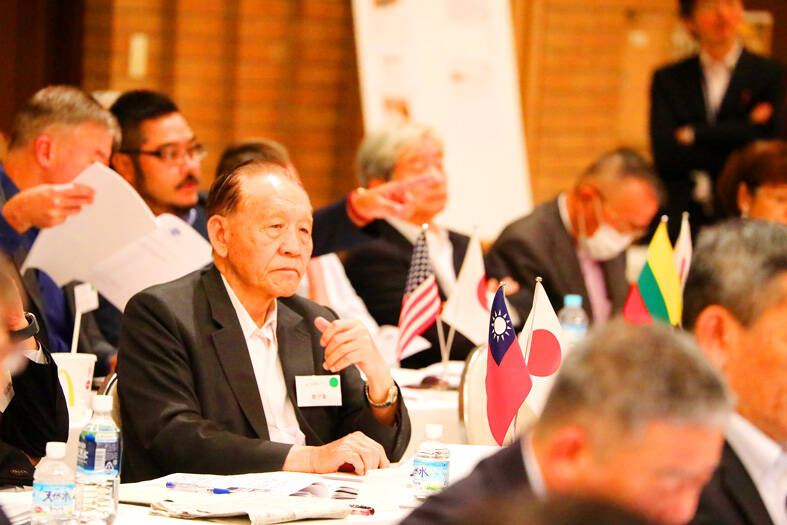A tabletop exercise conducted by a Japanese think tank simulating a Chinese invasion of Taiwan ended with the Chinese People’s Liberation Army (PLA) being cut off from logistics at sea and a deadlock on land, before the UN mediated an armistice.
The Japan Forum for Strategic Studies hosted the exercise in Tokyo on Saturday and Sunday in collaboration with military officials and analysts from Taiwan, the US and Japan. It was the third such simulation the think tank had conducted this year.
Taiwan’s participation in the exercise was a first.

Photo: CNA
The exercise simulated the PLA attacking the area from New Taipei City’s Bali District (八里) to Hsinchu’s Nanliao (南寮), said Su Tzu-yun (蘇紫雲), director of defense strategy and resources at the Institute for National Defense and Security Research (INDSR).
The tabletop scenario was similar to the field exercise portion of this year’s annual Han Kuang military exercises, which are to be held from Monday to Sunday next week, Su said.
The outcome was considered a victory for the Taiwanese, US and Japanese defenders, as the PLA was “effectively stopped from pushing into the interior” of Taiwan proper, he said.
The three countries’ representatives took note that a politically significant settlement could only be reached if the PLA’s forces on Taiwan proper were completely expelled or eliminated, Su said.
The simulation had three distinct phases: China’s initial efforts to isolate Taiwan, Japan providing Taiwan with logistical and humanitarian aid, and Beijing ordering the invasion of Taiwan and missile attacks on Japan, he said.
The first phase of the exercise had China launching a disinformation campaign against Taiwan and Japan, cutting the Internet cables to Taiwan proper and Okinawa, and landing Chinese fishers on the Diaoyutai Islands (釣魚台), known as the Senkakus in Japan, he said.
In the second phase, Tokyo agreed to offer logistical support and humanitarian aid to Taiwan at the US’ request, Su said.
The third phase simulated PLA offensive operations aimed at taking over Taiwan proper and its outlying islands, and included missile strikes on bases used by the US military and the Japanese Self-Defense Forces, he said.
Taiwan’s armed forces stopped the PLA from entering the main island’s interior, while joint US-Japan undersurface operations crippled the PLA’s ability to acquire reinforcements and supplies from sea, the INDSR said.
As fighting in the areas around Taiwan shifted in favor of the defenders, the UN and the International Committee of the Red Cross intervened to mediate a ceasefire, the institute said.
The exercise was part of the bilateral security dialogue between Taiwan and Japan, it said.
Japanese Representative and former defense minister Itsunori Onodera, several retired Japanese Self-Defense Forces officers, INDSR chairman Huoh Shoou-yeh (霍守業), INDSR deputy CEO Lee Ting-sheng (李廷盛) and Su played a role in the simulation, it said.

AIR SUPPORT: The Ministry of National Defense thanked the US for the delivery, adding that it was an indicator of the White House’s commitment to the Taiwan Relations Act Deputy Minister of National Defense Po Horng-huei (柏鴻輝) and Representative to the US Alexander Yui on Friday attended a delivery ceremony for the first of Taiwan’s long-awaited 66 F-16C/D Block 70 jets at a Lockheed Martin Corp factory in Greenville, South Carolina. “We are so proud to be the global home of the F-16 and to support Taiwan’s air defense capabilities,” US Representative William Timmons wrote on X, alongside a photograph of Taiwanese and US officials at the event. The F-16C/D Block 70 jets Taiwan ordered have the same capabilities as aircraft that had been upgraded to F-16Vs. The batch of Lockheed Martin

GRIDLOCK: The National Fire Agency’s Special Search and Rescue team is on standby to travel to the countries to help out with the rescue effort A powerful earthquake rocked Myanmar and neighboring Thailand yesterday, killing at least three people in Bangkok and burying dozens when a high-rise building under construction collapsed. Footage shared on social media from Myanmar’s second-largest city showed widespread destruction, raising fears that many were trapped under the rubble or killed. The magnitude 7.7 earthquake, with an epicenter near Mandalay in Myanmar, struck at midday and was followed by a strong magnitude 6.4 aftershock. The extent of death, injury and destruction — especially in Myanmar, which is embroiled in a civil war and where information is tightly controlled at the best of times —

Taiwan was ranked the fourth-safest country in the world with a score of 82.9, trailing only Andorra, the United Arab Emirates and Qatar in Numbeo’s Safety Index by Country report. Taiwan’s score improved by 0.1 points compared with last year’s mid-year report, which had Taiwan fourth with a score of 82.8. However, both scores were lower than in last year’s first review, when Taiwan scored 83.3, and are a long way from when Taiwan was named the second-safest country in the world in 2021, scoring 84.8. Taiwan ranked higher than Singapore in ninth with a score of 77.4 and Japan in 10th with

SECURITY RISK: If there is a conflict between China and Taiwan, ‘there would likely be significant consequences to global economic and security interests,’ it said China remains the top military and cyber threat to the US and continues to make progress on capabilities to seize Taiwan, a report by US intelligence agencies said on Tuesday. The report provides an overview of the “collective insights” of top US intelligence agencies about the security threats to the US posed by foreign nations and criminal organizations. In its Annual Threat Assessment, the agencies divided threats facing the US into two broad categories, “nonstate transnational criminals and terrorists” and “major state actors,” with China, Russia, Iran and North Korea named. Of those countries, “China presents the most comprehensive and robust military threat